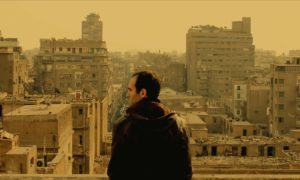The cinematic love letter to Cairo that none of its residents will see
Tamer El Said’s In the Last Days of the City documents life in the Egyptian capital over 10 years, but authorities have refused him a permit to show it
Ask a Cairo resident to describe the most frustrating thing about living in the Egyptian capital, and they will likely tell you about the noise, the chaotic streets and the proselytising taxi drivers.
However for director Tamer El Said, it is precisely these everyday gripes that form a central part of his new film In The Last Days of the City – a proud requiem to the bustling metropolis that also reflects on how the 2011 revolution has changed Cairo’s urban fabric.
Set in the lead up to the Arab Spring and filmed in the busy downtown area, In the Last Days of the City tells the story of a director, Khalid, as he struggles to capture the city that he loves on film, distracted by the pressing need to find himself a new place to live.
The film blends set scenes and documentary-style footage of real people playing themselves, blurring the boundaries between reality and fiction. “I told my crew that we wanted to film the soul of the city, not its image – I didn’t want to make a series of postcards for tourists,” said Said.
But now, due to a de facto ban on the film across Egypt, no Cairo resident will be able to see it. Like many of the city’s public spaces in the aftermath of the revolution, when millions of Egyptians took to the streets calling for the downfall of president Hosni Mubarak, the film has fallen victim to a new government crackdown on civil liberties.

A scene where Khalid filming his friends in a downtown street – an act that the filmmakers say would be impossible in the current political climate
As a result of the weeks of mass protest in of Tahrir Square and cities across Egypt, Mubarak resigned. But two tumultuous years later, Abdel-Fatah al-Sisi seized power in a popularly backed military coup. Cairo, once the beating heart of the uprising against quickly became tightly patrolled into obedience, and as a result, the downtown streets portrayed with such emotion in Said’s film are now under heavier surveillance than ever before.
Filmmakers require permission from Egypt’s Ministry of Culture for their work to be seen publicly, and filming in the capital has become nigh on impossible. “We never got the permit from the censors for public screening, neither for the film nor the trailer and the poster. We’ve been trying to get this permit for more than nine months but it seems it will never happen. Clearly, it’s a way to ban the film without announcing it publicly,” explained Said.
Any attempt to publicly screen the film could now result in arrest.
The Egyptian revolution, as well as the 2013 coup and subsequent massacre of 817 protesters, were all captured on mobile phones, generating hours of footage chronicling the city’s tectonic political changes. The current restrictions on artistic freedoms in the city are a reaction to this visibility, and the strict bureaucratic and security obstacles that have been put in place to prohibit filming in public ensure Cairo’s streets are now rarely, if ever, shown on film.
In one scene in The Last Days of the City, Khalid, played by filmmaker and actor Khalid Abdalla, pulls out a small handheld camera in a cafe and begins filming his friends – an impossible act in today’s Cairo where a camera of any kind almost immediately results in the swift appearance of the security services.
Journalists or filmmakers wishing to shoot in the city centre are now forced into a Kafka-esque battle for permits from several different authorities. Even those with the correct accreditations can be detained, such as the three journalists who were arrested in October for filming vox pop interviews, and later charged with “inciting terrorism” and “spreading false news”.
“I always say the film was a ‘mission impossible’ during Mubarak’s time, but this didn’t stop us from trying,” said Said. “Just getting the permit to film downtown was torture – maybe it took more than a year to secure permits, and we had to renew it every two weeks. But now I don’t think we would even try. It wouldn’t work.”
It is a sharp shift for the city, which has long been served as a backdrop for some of Egypt’s most loved films, part of a rich tradition stretching back to the early 20th century. Yet unlike other recent productions, such as Clash – which showed a slice of Egyptian society reacting to the toppling of the head of the Muslim Brotherhood – In the Last Days of the City has not made it past the censors.
“This was something that was chasing me all my life: my right to hold a camera in my city,” said Said. “I travelled the world and saw other filmmakers dealing with their cities through their cameras and I wasn’t allowed to have this. Cairo is a very photogenic city and I always wanted to learn how to film it.”
The film has received international acclaim, and has been described by Variety as “a plangent, multi-layered dirge to the sensory overload of the capital [which will be] best appreciated by those who know the city.”
But while Said is travelling the world to promote it, Cairo remains deprived of an opportunity to reflect on the many changes that have shaken and shaped its streets since 2011.
• In the Last Days of the City will be screened in the UK in August at the ICA Cinema in London, HOME in Manchester, Watershed in Bristol and other venues across the country
• Tamer El Said and Khalid Abdalla will will host a workshop entitled The Self and the City at the ICA on 3 August
https://www.theguardian.com/cities/2017/jul/12/cinematic-love-letter-cairo-last-days-city
